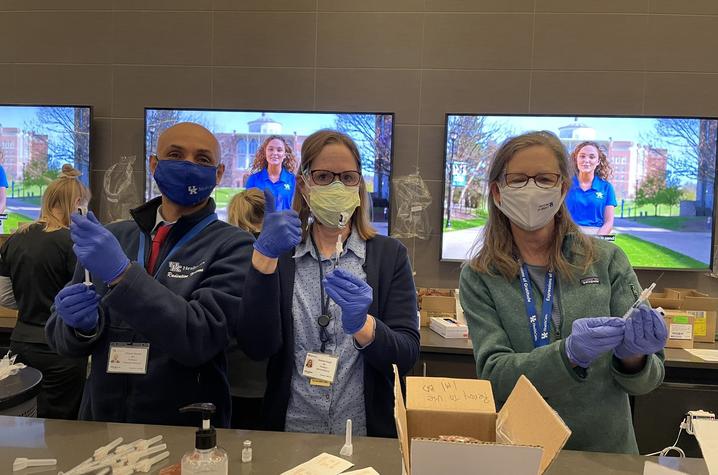Markey Cancer Center Encourages COVID-19 Vaccinations for Cancer Patients
LEXINGTON, Ky. (April 12, 2021) — With COVID-19 vaccinations continuing to roll out across the country, the University of Kentucky Markey Cancer Center strongly encourages both cancer survivors, caregivers and patients in active cancer treatment to receive one of the available vaccines. This is in line with recommendations from both the Centers for Disease Control and Prevention (CDC) and the American Cancer Society.
As of Monday, April 5, any Kentuckian age 16 and up is eligible to get the Pfizer vaccine. The Moderna vaccine is available to anyone age 18 and older.
"Given the higher rates of severe COVID-19 infection in cancer patients, the American Society of Clinical Oncology and the CDC recommend that cancer patients strongly consider vaccination against COVID-19," said Dr. Frederick R. Ueland, gynecologic oncologist and director of oncology clinical operations at the UK Markey Cancer Center. "This includes cancer survivors, most patients undergoing cancer treatments and their caregivers and household contacts."
“The National Cancer Institute and the National Comprehensive Cancer Network recommend all solid tumor patients receiving chemotherapy, checkpoint inhibitors or other immunotherapy, and/or radiation receive COVID-19 vaccination as soon as possible,” said Dr. Susanne M. Arnold, Markey medical oncologist and associate director of clinical translation. “We do suggest that those undergoing major surgery separate their vaccination at least a few days from the date of surgery to avoid fever or other side effects from the vaccine on the surgery day.”
While vaccination is recommended for all patients receiving active therapy, there are additional recommendations for certain blood cancer patients: those who have undergone intensive cytotoxic chemotherapy for acute leukemias should wait until their blood work shows that their white blood cell counts have recovered before getting the vaccine. Additionally, patients who have received a hematopoietic cell transplantation (also known as bone marrow transplant) or engineered cellular therapy (e.g. CAR-T cells) should delay their COVID-19 vaccine for three months following treatment to maximize the efficacy of the vaccine.
"Patients who are unsure or severely immunocompromised, including those who have had bone marrow transplantation or CAR-T therapy, should discuss the risks and benefits with their oncologist before being vaccinated," Ueland said.
Because the initial COVID-19 vaccine trials did not enroll people who may have weakened immune systems (from disease or from a treatment, like chemotherapy), data on the safety and efficacy of the vaccines in these people is limited. However, most experts recommend that cancer patients get the vaccine, because even if the vaccine is less effective than it would be in patients with healthy immune systems, some protection is better than none.
“I’ve taken the vaccine, and I encourage everyone to do so,” Arnold said. “Your participation can save other people’s lives by decreasing the spread of this terrible virus in our community, increasing the immunity of our state and nation overall, and it can also save your life.”
Patients can further protect themselves by asking members of their household, close contacts and caregivers to get vaccinated.
If you are undergoing active cancer treatment and have any questions or concerns about your specific situation, talk to your oncologist or a member of your care team.
To register to receive a vaccine through UK, visit ukvaccine.org. You may also call 859-218-0111 and someone will assist you. Once you are registered and vaccines become available, you will receive an invitation to schedule a day and time to receive your vaccination.
As the state’s flagship, land-grant institution, the University of Kentucky exists to advance the Commonwealth. We do that by preparing the next generation of leaders — placing students at the heart of everything we do — and transforming the lives of Kentuckians through education, research and creative work, service and health care. We pride ourselves on being a catalyst for breakthroughs and a force for healing, a place where ingenuity unfolds. It's all made possible by our people — visionaries, disruptors and pioneers — who make up 200 academic programs, a $476.5 million research and development enterprise and a world-class medical center, all on one campus.





